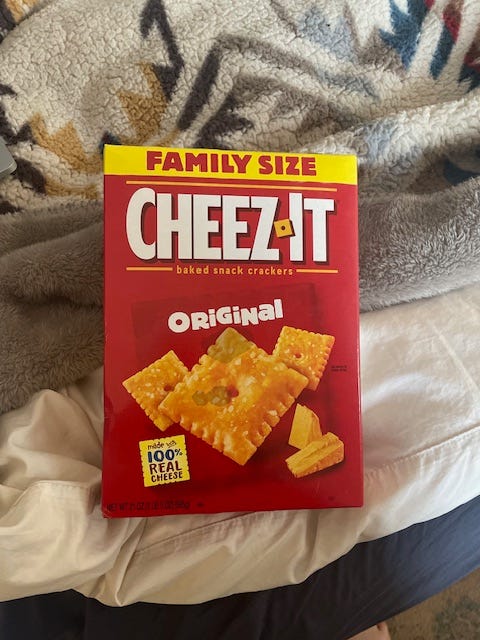Check out my first post here to read more about the namesake of this newsletter and make a copy of the input/output tracking sheet if you so desire.
Next 2024 Class!
Note: I am only teaching through April of this year. No more 2024 classes after that!
Comedy Writing for Non-Comedians through Writing Workshops, Saturday, March 9th, 1-3pm ET. (TWO SPOTS LEFT). Comedy is another tool in your writing toolbox, allowing you to write with a stronger voice, distinct point of view, and punchiness that can be applied to disciplines such as copywriting, ficton, nonfiction, speaking, and content writing. From the rule of three to whatever the heck a callback is, learn how to be funnier on paper…and even in real life! There will be a recording of the class avail for two weeks afterward if you can’t attend live. $75!
Recent testimonials from this class:
“You packed a huge amount of information into a very compact period. I’m very impressed with your follow-up as well. Way above and beyond.”
“Thanks so much for the amazing class, Caitlin! I really learned a lot about humor in general, as well as what interests me specifically. I only recently started writing humor, and your focus on premise and format were insanely helpful.”
"In theory, consistency is about being disciplined, determined, and unwavering.
In practice, consistency is about being adaptable. Don't have much time? Scale it down. Don't have much energy? Do the easy version. Find different ways to show up depending on the circumstances. Let your habits change shape to meet the demands of the day.
Adaptability is the way of consistency."
—Business Boy James Clear
Sometimes, Mr. Clear just hits with his little quotes. Especially when you have looming hard deadlines, the work left is challenging, and a week of time has just disappeared into a productivity vortex. I had a week like this two weeks ago.
A PANIC WEEK.
My Panic Week started with good intentions. I very sternly informed myself of the very tight deadline for the very important thing I absolutely needed to do, no shenanigans. I opened up all my work tabs and got out my reference materials. I caffeinated and put on my work focus beats and my favorite monotone sweatsuit for powerful writing.
Then I proceeded to spiral for the entirety of the work week.
I churned back and forth between ten open Google docs adding a few words at a time. I second-guessed every edit and cut I made. I felt physically ill. I cried at some point every day, which is like a year’s worth of crying for me. And by the end of the week I had made almost no forward progress at all on anything I worked on. I had lost an entire week at a time when I really needed every single hour.
I knew I needed to take the weekend to prep for the all-important next step: the week AFTER Panic Week. I had to break the cycle.
Luckily, that weekend I happened to be teaching my class “Write Like an Athlete,” which focuses on sports psychology and creatity practice, specifically on technqiues to reconnect the body and mind. Reviewing my class notes on Friday, I realized immediately that I’d been acting like a brain stem all week—ignoring my body and trying to force thoughts and words out of my mind despite my rising anxiety and panic. After reading my notes and adjusting my slide deck I shut the computer early (to my dog’s delight, he now associates the sound of the computer closing with HIS TIME), went for a long walk, took a shower and stretched before going to bed early.
Saturday, I taught the class to an excellent group of people and felt myself go into flow state for the first time in over a week. I took time to journal afterward about what had made teaching feel so good—intense focus, preparation, connection, physical activity before and after, no internet or text distractions—and made a work plan for the following week.
But this time, I tried to be less disciplinarian and stern, and more gentle with myself. Rather than dive right back into trying to force-solve the problems that had stymied me so much the week before, I switched gears.
I started my recovery week by doing life admin on Monday to get a little forward momentum:
I did a final bit of work to resolve two tax questions that had held up filing for my entire household. Despite putting it off for three weeks it only took twenty minutes. All right, a little win! (sorry to my partner for this)
I got out of the house next. After being thwarted for months by BOTH the UPS Store and the Duane Reade claiming “their passport systems were down,” I was able to catch DR when it was up and someone would agree to take my photo. Is the picture good? No. Does my hair look flaming red, a color I wish it was in real life but absolutely is not, and is sure to cause future issues with the TSA? Yes. But will I be able to renew my passport before it expires? Yes. Small errand done, momentum rolling.
I continued a massive declutter and book cull I’ve been working on for a month now in an effort to a) make more space in my apartment and b) reduce visual clutter. During the height of the pandemic, being surrounded by my books felt soothing and comforting to me—who needs to engage with society? Look at all these books I can read inside happily forever! [nervous laughter]—but now, it feels stifling. We got our bedroom painted a dark blue and removed all the books from the dresser across from the bed, and I can’t get over how much I love the minimalist view as I go to sleep. I’m aiming for that in other rooms as well. This is an interesting take on eliminating visual clutter, termed, “quieting the room.”
After getting these three items done, it was…11am on Monday. I couldn’t believe how much better I felt already, but I was still afraid to confront my computer screen less I downward spiral faster than a Boeing Max with a bad MCAS.
So I went for a walk with my dog and sent myself voice memos related to the thorny issues I hadn’t been able to work out by staring angrily at my computer the week before. In between memos, I focused on my dog having a grand old time walking and peeing on the disgusting old snow banks. No email checking, just vibes. By the time I got home, I had seven voice memos that I transcribed as a way to get into my work.
I stopped working early that day, just to preserve the win, and continued my declutter.
Tuesday, I finished a messy draft complete with helpful notations like “INSERT ACTUAL THOUGHT HERE” and “THIS WILL TAKE LONGER TO WRITE THAN YOU THINK.” But the framework was there!
Wednesday, I sent a complicated email I had been stymied on how to phrase due to timeline and numerous moving pieces. I edited in the afternoon.
Thursday I wrote 3,000 words.
Friday I worked for six hours, wrote 4,000 words, and had an excellent two-hour meeting.
I finished the week the good kind of exhausted, where you know you did the work. I had done it. It hadn’t been ideal to write that many words in one week, but I had pulled out of the panic and found my way back. I took a nap both weekend days and starting this week, today, I feel back to normal in terms of working at a more reasonable pace without anxiety and panic clouding my vision.
And don’t worry, I treated myself:

What do you do to help recenter and recover after a “lost period” of creative work? Do you ever have Panic Weeks?
Do me a favor—if you like these newsletters, hit the heart button! This helps more people in the Substack Network find it.
ABOUT ME: My name is Caitlin Kunkel and I’m a comedy writer, long-time teacher, and creator of The Second City’s Online Satire Writing Program. I currently teach classes and consult on gift book proposals, modern adaptation, satire, and comedic literature. I co-founded The Belladonna Comedy and the Satire and Humor Festival, and I co-wrote the satirical gift book New Erotica for Feminists: Satirical Fantasies of Love, Lust, and Equal Pay, named one of the Top 10 Comedy Books of 2018 by Vulture.



Oof, can so relate to this experience of gearing up for an epic productivity week—and then spiraling the entire time 😵💫 Appreciate these gentle reminders of how to reset for the all-important week *after* panic week!
Enjoyed this! I can feel and relate to the panic! I spend too much time getting mad at myself for being unproductive, not starting early enough, being unfocused, having a headache which is my fault because I didn't sleep well which is my fault because XYZ. ETC! When it comes to the work, I find I can de-escalate my aggravation and catastrophizing by focusing on minimal time chunks, i.e., instead of outcome-focused thoughts--"I need to finish writing this book! Prepare for this class! Answer all emails!" I will try, "Can I work for one hour on each of three tasks, and truly expect nothing else, regardless of actual work accomplished in that time?"